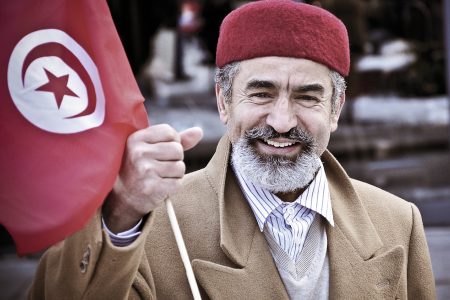
Return to Tunis
Issue 78 March 2011
After over 20 years in exile, the Jasmine Revolution compels London lawyer Intissar Kherigi to return to her native Tunisia.
We had been following the protests on Al Jazeera. The western media had paid little attention to the four weeks of demonstrations. Yet here we were at a historical moment—the first overthrow in recent history of an Arab dictator by his own people, without the need for an army or foreign intervention. Zine el Abidine Ben Ali - tyrant, torturer and thief—finally fled Tunisia. From the moment Mohammed Bouazizi had publicly set himself alight in a remote dusty town in the southern reaches of Tunisia, Ben Ali’s power ebbed away.
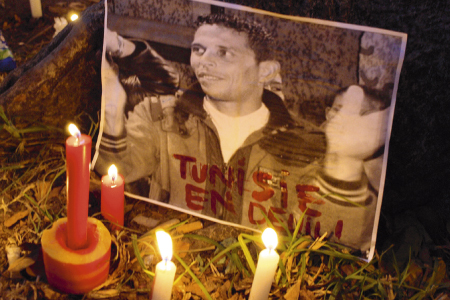
The death of Mohammed Bouazizi, a young Tunisian graduate trying to make a living, sparked a regional revolution.
Bouazizi’s was a shocking act; a searing indictment of the devastating effects of poverty, corruption and the ruthless repression of human lives. Those of us who had followed the sad state of this beautiful country, ruled by Ben Ali’s iron fist for 23 years, were not entirely surprised. Tunisians had lived in the shadow of tyranny and grown accustomed to government brutality. Most looked on and kept silent, helpless before the vicious machinery of repression. To speak was to bring ruin upon yourself and your family. Bouazizi’s self-sacrifice was the most helpless, yet paradoxically the most powerful act of dissent. He had turned the violence onto himself, giving voice to an entire nation’s anger, humiliation and despair.
Despite being consistently ranked below Iran, Zimbabwe and China, for 20 years the western media ignored the human rights abuses in Tunisia, preferring to focus on the other countries because they chimed well with the wider political agendas. The drip, drip of daily injustice finally overfilled the cup – and like a dam bursting its wall, the Tunisian people broke their silence; their cry for dignity reached all corners of the world, and caused waves throughout the region. Could this tiny country be the catalyst for reform in the Arab world, lifting the Arab peoples out of their stupor?
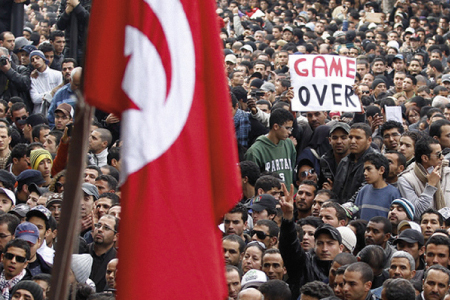
Together with my family and fifty other Tunisian exiles, we were to return to Tunis. When I had left at the age of five, I thought we were taking a short holiday. Twenty years later, I had resigned myself to never returning. The absence was particularly cruel for my parents who had been uprooted from a lifetime of memories. My mother had not seen her mother for 21 years, whilst her father had died in her absence. My father had been hounded out by the regime, yet he never ceased to think of Tunisia for a day, constantly campaigning, writing and speaking on the issue. Now, we were to rediscover the place which was our beginning—our roots, hopes and dreams.
Silence descended on the plane as all eyes turned to the sparkling green sea breaking onto golden shores. I turned to look at my father and found him watching silently, overwhelmed with emotion. The moments between that first glimpse and our eventual landing felt like a lifetime, but as the plane touched down a spontaneous burst of applause erupted around us and a few shouted “Allahu Akbar!” I rushed down the steps, pausing to whisper “bismillah” before stepping onto the ground, savouring this unforgettable moment. As we boarded the bus to the airport terminal, everyone hugged each other and burst into singing the national anthem. There was not a dry eye on the bus. Every face told a story—of jubilation, heartache, longing, but most of all, of triumph and dignity.
We found the airport filled with people who had come to greet the exiles. There were crowds as far as the eye could see, all chanting and some throwing flowers at us. Strangers embraced us warmly. An old lady clasped my hand and cried, “Welcome to your country!” We were bundled into a car and driven through the throngs to my uncle’s house, where our extended family was waiting. As we passed through the wrought iron gates under a fragrant jasmine tree, I caught sight of aunts, uncles, great-aunts and cousins all awaiting our arrival. The rest of the day passed in a blur of greetings, tears of happiness and excited chatter as we caught up on over 20 years of lost time.

My grandmother was waiting for us as if we had never left; she lifted her hands to the sky and thanked God for this day. After repeated embraces, we huddled around her as she told us what she had endured in our absence. She had been evicted from her home by the ruling Trabelsi family, who had stolen the house, pillaged its contents and turned my grandmother out on the street with nothing but the clothes on her back. For 15 years, she had been forced to move from place to place, renting small rooms while fighting a legal battle to regain her family home, built for her by my grandfather and where she had brought up her children and lived for 30 years. It had been an elegant, sprawling suburban villa where she cultivated orange and lime trees and jasmine flowers, but now she was sharing a small, shabby, damp room with her son and daughter, who had been stripped of their passports and prevented from working. She narrated all this without any bitterness or anger, praising God for this moment. As we walked away from the house with heavy hearts, all of us were silent, overwhelmed by the visit. I could not stop my tears at her years of suffering and indignity. But I also felt pride in this woman, who had survived the years through faith alone.
I looked on curiously at this country of mine in which I felt like a stranger. Our own house had also been taken over during our absence and stripped of all its contents. As I stepped inside, we could see the walls cracked by years of neglect. The floor was covered in debris; there was mould everywhere. I stooped to find an exercise book belonging to my sister from 1989, and old family photos, remnants of a bygone era. In a way, it reminded me of the country as a whole—emerging from decades of mistreatment, neglect and exploitation, the victim of a ruler who cared nothing for it, who abused and exploited it to the full. Yet, just as this house held memories of the past and was waiting to be rebuilt, Tunisia was also waiting to be transformed on new foundations of justice and dignity.
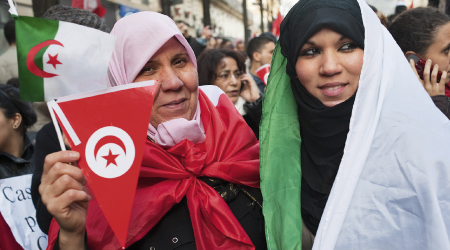
In all the heartbreaking stories I heard in Tunis, the single note that emerged is that of hope and resilience. I am amazed by the deep humanity and strength of those I met. Each has his tale of sorrow and loss, but despite the decades of suffering most are not bitter about the past, only hopeful at the future. In a region where people have long been portrayed as irrational, emotional mobs, Tunisians have shown remarkable civility in their revolution. There is a deep awareness among people of what they want—a life of freedom and dignity, and a system based on justice. Despite enduring over 50 years of authoritarian rule, Tunisians are determined that their sacrifices will not go to waste. As the Qur’anic verse uttered by many I met states, “Truth has come and falsehood has disappeared. Surely falsehood is ever bound to vanish.”
Photography Credits - Yasmine Gheribi, Mohamed Elorbany, Sherif al-Leithy, Martin Argyroglo
Bookmark this |
|
Add to DIGG |
|
Add to del.icio.us |
|
Stumble this |
|
Share on Facebook |
|
Share this |
|
Send to a Friend |
|
Link to this |
|
Printer Friendly |
|
Print in plain text |
|

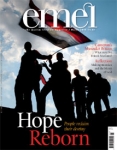
Comments
0 Comments